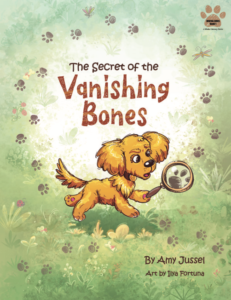
First-of-its-kind children’s book series helps kids develop digital detective skills prompting inquiry, analysis and questioning of content in each K-5 story.
SAN MATEO , CALIFORNIA , UNITED STATES, July 1, 2021 /EINPresswire.com/ — The pandemic has doubled children’s screen time yet produced zero media literacy solutions to inoculate vulnerable K-5 kids against media misinformation and digital exploitation until now.
Amy Jussel, founder of nonprofit Shaping Youth, a media literacy organization focusing on media and marketing’s impact on kids, has just released an innovative children’s book series to fortify children with inquiry and analysis skills by embedding digital savvy into K-5 storytelling fun.
Building on her national media literacy expertise, the author created the timely Digital Dogs Book Series to instill critical thinking about media and technology, helping kids prevent data privacy leaks and algorithmic influences by building core habits of questioning into their digital exposure at increasingly younger ages…even in kindergarten.
The Secret of the Vanishing Bones: Tracking the Data Trail is the first in the Digital Dogs Book Series, as a playful pack of pups sleuth, sniff around and dig deeper into questions about media messages and the technology being used, learning data privacy tips and developing digital detective skills to solve the mystery.
“Kids are already using devices early on, they’re just unaware of how the devices are also using them,” Jussel said, “as adults, we need to help them reflect on this so they can regulate the mass of messages coming their way, inoculated through critical thinking.”
Unlike any other in the “kid lit” genre, each book embeds both digital and media literacy directly into the storyline, so kids develop the ability to detect, discern and reflect on the media coming their way, instilling healthy, habit-forming questioning of all content.
Who made this and why? What does this want me to think about? Why does this site know what I like already?
Through subtle, seamless storytelling kids pick up life skills and tech tips, raising awareness of media and influences online and off. As children become aware of their own role in consuming, creating and connecting with media, they’re empowered to think critically about every click and swipe.
“I strongly feel media literacy should be taught in every classroom as early as kindergarten, but we can’t wait around for that legislation,” Jussel said, “…informal learning through stories, activities and hands-on fun gets us there faster. Whether it’s delivered by parents, educators, siblings or a read aloud group, kids need these inquiry skills, yesterday.”
“I’ve been writing and producing media all my life,” she said, “but working with underserved youth that click and tap before they can read, it’s important they know where their actions land and discover their own role in the media being served.”

